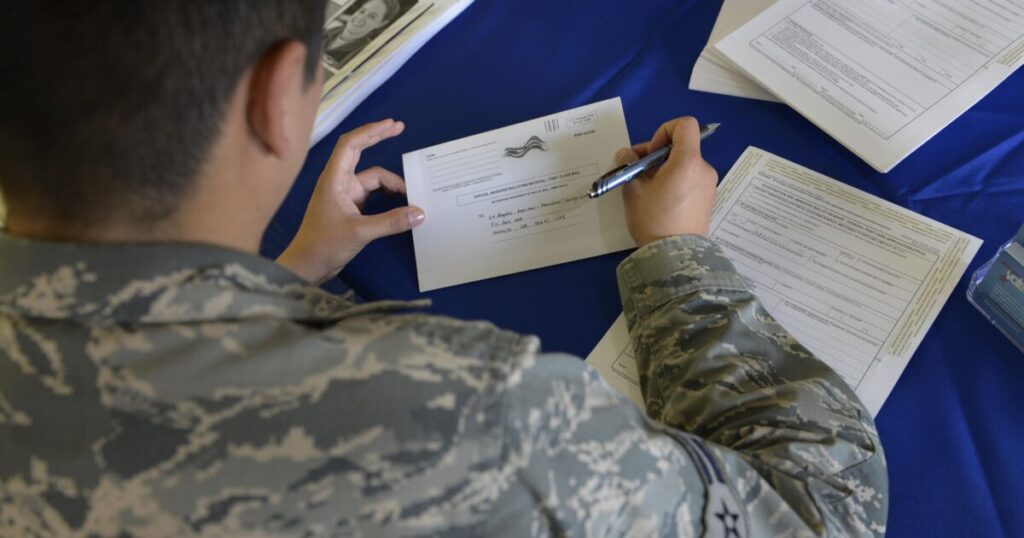In a recent call to action, Republican Representatives Brian Mast, Bill Huizenga, and Michael Waltz have raised significant concerns regarding the Pentagon’s handling of voting procedures for overseas service members. The lawmakers have accused the Department of Defense (DoD) of failing to ensure that write-in absentee ballots are readily available for troops deployed abroad, especially as elections approach. Representative Mast criticized President Biden and Vice President Harris for mobilizing federal resources to challenge state-level election integrity measures while neglecting the voting rights of servicemen and women. He emphasized the necessity for every member of the military to have the opportunity to vote, particularly when their future commander-in-chief will be responsible for making critical decisions that affect their lives.
The frustration surrounding the voting situation for overseas service members is palpable, as echoed by Rep. Waltz, who highlighted the importance of ensuring that service members are adequately informed and equipped to participate in elections. He expressed disdain for the dismissive attitudes displayed by the current administration towards those serving in combat zones. Echoing this sentiment, Rep. Huizenga called it unacceptable that troops stationed abroad are not receiving the essential resources and information needed to exercise their right to vote. Representative Anna Paulina Luna also joined the conversation, demanding accountability from the Secretary of Defense for the lack of federal write-in ballots reaching service members stationed overseas.
Reports suggest a troubling trend where many service members have not received their mail-in ballots just days ahead of elections. Visits to military bases have revealed insufficient supplies of absentee ballots, leaving troops without reliable alternatives should their state-issued ballots arrive late. Moreover, the lack of crucial information regarding voter registration and absentee ballot requests has raised alarms about the Pentagon’s preparedness and commitment to facilitating voting for its personnel. In response to these issues, lawmakers sent a letter to Secretary Austin, urgently seeking transparency regarding the election preparedness measures in place for military personnel.
The letter articulated the lawmakers’ concerns about the Pentagon’s failure to adequately inform service members of their voting options or allocate sufficient resources to ensure they could exercise their rights. The lawmakers emphasized that many service members have encountered challenges in understanding how to register to vote and request absentee ballots. Complaints of depleted stockpiles of federal write-in absentee ballots were also highlighted, underscoring the pressing need for the Pentagon to rectify these issues to enable troops to participate in the electoral process. They asserted that ensuring the ability of military personnel to vote is especially critical in an election that will determine the next commander-in-chief.
The situation has been further exacerbated by reports of delays in mail-in ballots for military families. Harmeet Dhillon, head of Arizona’s Election Integrity Team, noted her assistance to military families dealing with such delays, urging all U.S. military families to verify their voting eligibility as mandated by the Uniformed and Overseas Citizens Absentee Voting Act (UOCAVA). This act allows military personnel and overseas citizens to vote absentee, but issues related to optional requirements have raised questions regarding voter verification.
The urgency surrounding the availability of UOCAVA ballots has intensified, with former Trump spokesperson Liz Harrington signaling alarming trends in the distribution of these ballots compared to previous election cycles. Data indicates a significant increase in the number of UOCAVA ballots issued for the 2024 election, suggesting a sense of urgency and possible inadequacies in the current voting system. Harrington’s assertions about the staggering rise in UOCAVA ballots in states like Georgia and Pennsylvania raise further suspicions regarding the integrity of the voting process, especially as some officials have reportedly discouraged verification of these ballots. As the situation unfolds, advocates for military voting rights are rallying for immediate action to ensure that service members can cast their votes and have their voices heard in upcoming elections.

